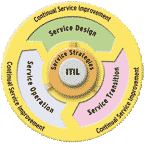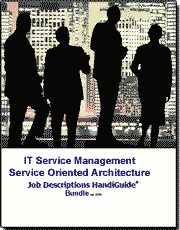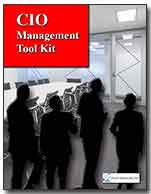ITSM - SOA Policy Template
ITIL Compliant
Change Control - Help Desk - Service Requests
Blog - Personal Web Site - Sensitive Information
Order IT Service Management Template Download ITSM Template TOC
ITSM - SOA Policy Template - The IT Service Management Policy Template is a 150 page document that contains policies, standards, procedures and metrics. Topics included in the tempate are:
- Service Requests Policy

- Service Request Standard
- Help Desk Policy
- Help Desk Standards
- Help Desk Procedures
- Help Desk Service Level Agreement
- Change Control Standard
- Change Control Quality Assurance Standard
- Change Control Management Workbook
- Documentation Standard
- Application Version Control Standard
- Version Control Standard
- Internet, e-Mail and Electronic Communication Policy
- Blog & Personal Web Site Policy
- Travel and Off-Site Meeting
- Sensitive Information Policy
In addition, the ITSM template includes the Business and IT Impact Questionnaire, a Change Control Request Form and an Internet Use Approval Form. It conforms with ITIL.
The template can be purchased by itself or with supporting job descriptions. We do provide an update service for the template as it is modified. You can see a full table of contents and some sample pages by clicking on the link below.
Order IT Service Management Template Download ITSM Template TOC
IT Service Management Job Descrption Bundle
ITSM is process-focused and in this sense has ties and common interests with process improvement movement  frameworks and methodologies. The discipline is not concerned with the details of how to use a particular vendor's product, or necessarily with the technical details of the systems under management. Instead, it focuses upon providing a framework to structure IT-related activities and the interactions of IT technical personnel with business customers and users.
frameworks and methodologies. The discipline is not concerned with the details of how to use a particular vendor's product, or necessarily with the technical details of the systems under management. Instead, it focuses upon providing a framework to structure IT-related activities and the interactions of IT technical personnel with business customers and users.
ITSM is generally concerned with the "back office" or operational concerns of information technology management (sometimes known as operations architecture), and not with technology development. For example, the process of writing for sale, or designing a microprocessor would not be the focus of the discipline, but the computer systems used by marketing and business development staff in software and hardware companies would be. Many non-technology companies, such as those in the financial, retail, and travel industries, have significant information technology systems which are not exposed to customers.
|
|

